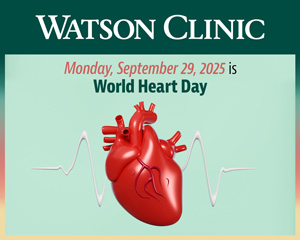 Improving your heart's health may seem like a big project, but even small changes in your daily habits can make a difference. Here are five simple steps you can get started on right away.
Improving your heart's health may seem like a big project, but even small changes in your daily habits can make a difference. Here are five simple steps you can get started on right away.
1. Bring a piece of fruit to work. Eating more fruits (and veggies) is a heart-healthy choice. Plus many fruits are portable (think apples, oranges and bananas), which makes them an easy snack option. When hunger hits, having a piece of fruit at your work area will help you avoid less-healthy options from the vending machine.
2. Take a 10-minute walking break. If you sit behind a computer most of the time, get up for a quick stroll several times a day. Sitting less and moving more is good for your ticker and your body overall. Keep in mind it's easier to fit in the recommended 30 minutes of movement every day if you divide the time into shorter bouts.
3.Give your screens an earlier bedtime. Too little sleep can hurt your heart and increase your risk for other diseases, such as obesity and type 2 diabetes, which can also affect heart health. Watching TV or using your smartphone or computer close to bedtime can keep you awake. Try giving yourself a deadline for turning off your screens an hour before bedtime every night. Relaxing to music or a book may help you doze off.
4. Have a hearty laugh. Laughter eases stress, which is a good thing because too much stress may boost your risk for heart disease. For a regular dose of mirth, set aside time to watch some laugh-out-loud videos.
5. Compare food labels for sodium content. Too much sodium can boost blood pressure, which is hard on your heart. Different brands of foods can have different sodium amounts. It only takes a moment to read food labels and to choose the brand with the least amount of sodium. You might be surprised to learn that some foods that don't have really high levels of sodium, like bread, are among the top sources of the mineral in the American diet—simply because we may eat several servings of them a day.
Watson Clinic's Cardiology department leads the way in offering the highest caliber of cardiac care in our community. Visit WatsonClinic.com/Cardiology for more information or call 863-680-7490 to schedule an appointment.
Sources: American Heart Association; Centers for Disease Control and Prevention; National Heart, Lung, and Blood Institute